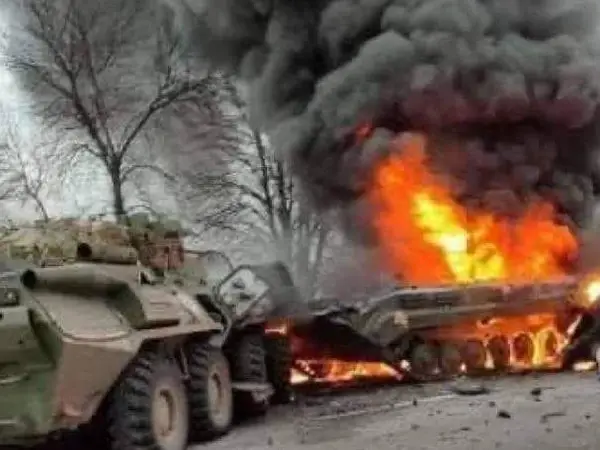Iran's foreign minister has supported Russia's invasion of Ukraine by casting the blame on NATO and the US, but not everyone in Iran agrees with his position.
"The Ukraine crisis is rooted in NATO's provocations. We don't believe that resorting to war is a solution. Imperative to establish ceasefire and to find a political and democratic resolution," Foreign Minister Hossein Amir-Abdollahian tweeted Thursday.
Mostafa Arani, assistant chief editor of 7Sobh newspaper, in a tweet referred to Amir-Abdollahian's remark saying he avoided mentioning Russia's role in the crisis and only blamed the US and NATO. "Even [Russian Foreign Minister] Sergei Lavrov can't defend Russia as Amir-Abdollahian has done,” he wrote.
Unlike other media outlets, Iran's state broadcaster (IRIB), state-affiliated media such as Fars and Tasnim news agencies, and others associated with hardliners have so far markedly avoided the use of the word "attack" for the Russian invasion. Instead, they refer to the attack as "Russia's special military operations in eastern Ukraine".
The official stance has angered many who find the reporting very biased. Reza Ghobishavi, deputy editor of conservative Asr-e Iran news website, also criticized the media that appear to have sided with Russia and said they had "sacrificed their credibility by siding with Russian President Vladimir Putin".
In a rare incident, Hasan Beheshtipour, a conservative political analyst who often appears on IRIB programs for comments, strongly criticized Russia's invasion of Ukraine and Iran's official stance in a live program. "Invasion whether by the US or Russia is not defensible in any way… Why are you defending Russia? How do you know that Russia will not do the same to Iran some day?" he asked.
"The IRIB is reporting the situation as if it were [the mouthpiece] of a Russian colony," former conservative lawmaker Ali Motahari said in a tweet Thursday.
Motahari also said Iran should condemn the Russian invasion of Ukraine and show its independence. "We must always remember how [Tsarist] Russia took Georgia, Azerbaijan, and Armenia from Iran [in early 19th century] and how the Soviets backed the invasion of Iran by Saddam [Hussein]," he added.
Others have also pointed out Iran's own history with Russia. "We were Russia's neighbors too. They [imposed] the Golestan and Torkmanchay treaties [in the 18th century], occupied Iranian territories during the WWI and WWII, and shelled the Razavi Shrine [in Mashhad]," sociologist Mohammad Fazeli wrote on Twitter. "At least do not give recognition to this military invasion. The logic behind the invasion of Iraq, Afghanistan and Ukraine is the same whether it's by the US or Russia."
Conservative journalist Mohammad Mohajeri in a tweet said he wished his country's foreign minister "had the guts" to condemn Russia's invasion of another country. Mohajeri accused the foreign policy apparatus of lacking "dignity and wisdom" and demanded an explanation of Iran's official stance.
The diplomatic editor of hardliner Tabnak news website, Mostafa Najafi, however, responded to Mohajeri that Iran's condemnation of the invasion would mean taking the West's side. "Why should Iran take the West's side in this matter when it is under their strictest sanctions? It would be best neither to condemn and take the West's side, nor to align ourselves with Russia. What matters is Iran's interests and national security," he argued.
Meanwhile, supporters of former President Mahmoud Ahmadinejad on social media said the current situation is proof of his claim a month ago that Russia and the US had made a "dirty deal" to divide Ukraine and Iran between themselves. "So far half of his prediction proved to be correct," a supporter tweeted.
